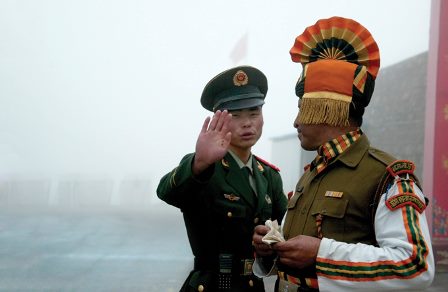Realpolitik dictates a policy of ‘congagement’ of China and explains America’s reasons for accommodating the former at the grand table. Thus, while the US-Chinese relationship is expected to remain the ‘most important,’ it is only to the point that the overall balance of power and global primacy remains with USA. Thus, while economics dictates that business can be done as usual, the USA would attempt to limit Chinese power projection capability thereby challenging the status quo in the Asia-Pacific region. The desire to do this by greater and more robust collaboration with established and new allies/partners is the underlying theme of the US re-balancing and is ‘pre-emptive’ in nature.
If China has become the factory of the world, it is because the West outsourced ‘low end’ manufacturing to her, as not only did this make sound economic sense, but it also provided major strategic gains as China was propped up to counter a powerful Soviet Russia.
‘Chess’ and ‘Go’ are ancient board games which originated in India and China; both require astuteness and well-considered strategies. ‘Chess’ being a hierarchical game, aims to attack the enemy’s centre of gravity – the ultimate symbol of power. On the other hand, victory in ‘Go’ is achieved by spatial domination and neutralising the opponent options. Translated in strategic/military parlance, Chess can be considered to be ‘attritionist,’ whereas Go is all about ‘manoeuvre.’ Multiple games analogous to ‘Chess’ and ‘Go’, are being played on the gargantuan board of Asia-Pacific. China and the USA are the main competitors while other powers are playing games that, in some way or the other, are linked with the larger outcome. The aim of this paper is to interpret the moves of each player within the larger context, in order to decipher which side is playing what game, to what end; and by doing so, recommend how ‘emerging’ India could enmesh her strategic goals ‘within’ what portends to be the game of the century.
It would be pertinent to highlight the change that has come about in a ‘globalised’ paradigm where multi-layered and multi-dimensional linkages bind nations and make their destinies acutely inter-dependent on each other. Apropos, traditional understanding of security has transmuted to ‘inclusive human security,’ which on one hand, is reducing chances of war but on the other, has intensified the competition since nations are constrained to vie for limited markets and scarce resources. This interdependence paradigm is exemplified by the complex Sino-American relationship. If China has become the factory of the world, it is because the West outsourced ‘low end’ manufacturing to her, as not only did this make sound economic sense, but it also provided major strategic gains as China was propped up to counter a powerful Soviet Russia. As a result of this western largesse, China with her booming economy has become the ‘largest trading partner,’ not only of the USA, but also of most of the countries with whom she also has adversarial relations: Japan, South Korea, Taiwan, Philippines, Vietnam and the like. Yet at the same time, this is what has created a militarily powerful China, who is threatening the established power equations and purportedly, has become a threat to the ‘free’ world.
It seems that the US strategy that ‘thriving’ America was good for China and vice-versa, has turned a full circle as this arrangement of convenience has been imbalanced due to the slow-down in the USA and the financial crisis in Europe. At the same time, this has affected Chinese manufacturing, as is evident from piling of inventories and reduction in maritime trade. Rebounding from this ‘low’ appears difficult, as in the corresponding period, production costs have also risen and China’s products no longer have the same competitive edge. Both sides realise that things can never be the same again, and this has initiated a new race for residual resources and under-tapped markets. This complex game of move and counter moves explains both China’s aggressiveness and America’s re-balancing.
China has her ‘war chests’ full and therefore, better placed for this clash of the century.
What is also important to point out that this could not have come at a worse moment as USA is yet to rebound from recession, and Europe is struggling to emerge from the Euro-zone morass, while on the other hand, China has her ‘war chests’ full and therefore, better placed for this clash of the century.
The game intensified after Mr Panetta’s flag-waving proclamation at the Shangri-La Summit, where the USA re-affirmed her resolve to retain global leadership. Conversely, an assertive China feels that she has finally arrived after a century of humiliation, and is now in a position to unshackle the hegemony over what she perceives to be her sphere of influence. Having said that, both sides are careful in avoiding direct confrontation and the game is being played by proxy; gaining moral ascendency in an increasingly complex Asia-Pacific board is the name of this new power game.
Realpolitik dictates a policy of ‘congagement’ of China and explains America’s reasons for accommodating the former at the grand table. Thus, while the US-Chinese relationship is expected to remain the ‘most important,’ it is only to the point that the overall balance of power and global primacy remains with USA. Thus, while economics dictates that business can be done as usual, the USA would attempt to limit Chinese power projection capability thereby challenging the status quo in the Asia-Pacific region. The desire to do this by greater and more robust collaboration with established and new allies/partners is the underlying theme of the US re-balancing and is ‘pre-emptive’ in nature.
By elaborating on the American plans to infuse fresh blood and resurrect the existing American ties with Japan, Philippines and Thailand, a clear message is being sent out to China. At the same time, this reaffirms US support to China’s neighbours who have been concerned by her growing belligerence. How much of this can be taken at face value and what others read from this signalling is for individual nations to interpret in accordance with their compulsions and aspirations. On the face of it, they seem to be caught between ‘the devil and the deep sea’. The question that lingers is that will the ‘enhanced’ American presence and defence cooperation be ‘adequate’ and ready in terms of time to take on the Chinese challenge. If the competition gets more pronounced, as it is likely to be, these countries, which lie on China’s periphery need to take a call to ensure their security and help counter the threat or corroborate with the new kid on the block.
India could definitely be the South Asian ‘pivot’ or ‘lynch-pin’ if it ushers peace and stability in her immediate neighbourhood.
By pronouncing India as a ‘lynch-pin’ in the new American policy, Mr Panetta may be meaning that, in the American calculus, India ‘could’ be a major player in this game. While this is potentially true, by no interpretation should Indian analysts take this to mean that the game planned to be played by the US in India’s immediate neighbourhood ‘cannot’ or ‘will not’ be played without them. At the same time, it is in India’s interests to collaborate on matters of strategic cooperation and defence technology, without having to take sides.
India is uniquely placed; in terms of her geographical location, potential and stature to make a significant contribution and help create conditions that bring stability in the immediate South Asian region that also affects South East Asia. India could definitely be the South Asian ‘pivot’ or ‘lynch-pin’ if it ushers peace and stability in her immediate neighbourhood. At the same time, it also needs to be said that USA must respect India’s sensibilities and she should not be made to feel that her strategic autonomy is being diluted in any manner.
While cooperation in economic and defence technology is welcome, it would be in everyone’s interests for India to ‘engage’ her neighbours to bring about ‘stability’ in her immediate periphery – Pakistan, Afghanistan, Sri Lanka, Nepal, Bangladesh and Myanmar. This is where India can enmesh with the larger game plan, apart from being a stabilising force in the Indian Ocean Region. If the game is played with tact and finesse and in the spirit of collaboration, this could become a ‘win-win’ situation for all.







India as a pawn
What America intends to do is to win at all cost, and that entails sacrificing the interests of anyone, including the allies, to achieve its goal.
By perusing India as a pawn in the chess game, India must realize that it must not be used by anyone (whether it’s USA or anybody else) to become the sacrificial lamb on the altar.
In the past century or so, the United States of America has betrayed plenty of its former “friends”, to the extend that it could turn “friends” into “enemy” at the flip of a coin.
Witness Saddam Hussein of Iraq – formerly used to counter the influence of Iran – and when Saddam’s worth has diminished, America turned around and set its forces on Saddam.
The fall of Saddam should ring a very clear bell to everyone who thinks that America is trustworthy.
This century and the next one (the 22nd century) will witness the fall of the Western civilization. Thus, it would be wise for us to pause and think before we decide to throw our support to the Western power in their game against their “enemy”, be it China, or India, or some other boogeyman the West wishes to prop up.